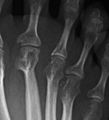JAMA: Genetic variations associated with the risk of susceptibility to
rheumatoid arthritis are also associated with responsiveness to
treatment, the risk of death, and severity of the disease as measured by
imaging, according to a study in the April 28 issue of JAMA. Advances have been made in identifying genetic susceptibility loci
(the specific site of a particular gene on its chromosome) for
autoimmune diseases, but evidence is needed regarding their association
with disease prognosis and treatment response, according to background
information in the article.
Anne Barton, Ph.D., F.R.C.P., of the University of Manchester,
England, and colleagues examined whether specific HLA-DRBl (a gene)
haplotypes (a set of DNA or genetic variations) associated with
rheumatoid arthritis (RA) susceptibility are also associated with
severity (as measured by radiological imaging), death, and response to
medications (tumor necrosis factor [TNF] inhibitor drugs). For the
analysis, the researchers used data from several sources that totaled
2,112 patients to evaluate radiologic severity; 2,432 patients to assess
mortality; and 1,846 patients to examine treatment response to TNF
inhibitor therapy. All patients were from the United Kingdom.
The researchers found that the HLA-DRBl locus was associated with
radiological severity of RA, risk of death, and response to treatment
with TNF inhibitor therapy.
“Replication of these findings in other cohorts is needed as a next
step in evaluating the role of HLA-DRBl haplotype analysis for
management of RA,” authors write.
(doi:10.1001/jama.2015.3435; Available pre-embargo to the media at http://media.jamanetwork.com)
The results of this study are important for 3 reasons, write David T.
Felson, M.D., M.P.H., of the Boston University School of Medicine, and
Lars Klareskog, M.D., Ph.D., of the Karolinska Institutet/Karolinska
University Hospital, Stockholm, in an accompanying editorial.
“First, these findings may add to the ability to predict outcomes of
RA, thus helping to optimize therapeutic strategies for different
patients. Second, the findings may add to the understanding of the
molecular mechanisms that determine disease course and mortality. …
Third, the findings by Viatte et al also help to inform understanding of
disease pathogenesis by strongly implicating HLA-dependent immune
events not only for the onset of RA, but also for disease course and
mortality.”
“Although the findings reported by Viatte and colleagues may not have
immediate clinical implications, identification of the precise HLA
variants that influence disease course is of great interest. These
observations open the door to further research, including replication
for this haplotype and discovery related to its combination with other
determinants of disease development and progression. Such discoveries
will prove helpful both to understand and predict the variable disease
course and response to therapy that occurs in patients with rheumatoid
arthritis.”
(doi:10.1001/jama.2015.1710; Available pre-embargo to the media at http://media.jamanetwork.com)
Editor’s Note:
Supported by a grant from the National Institutes of Health. The
authors have completed and submitted the ICMJE Form for Disclosure of
Potential Conflicts of Interest and none were reported.
